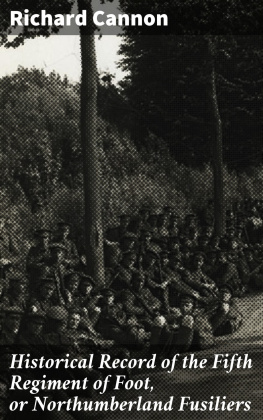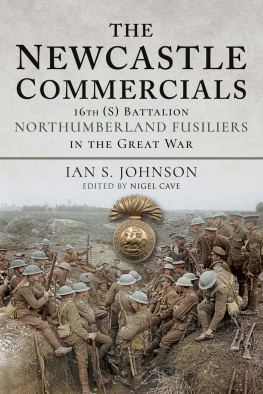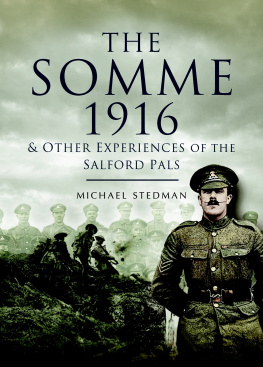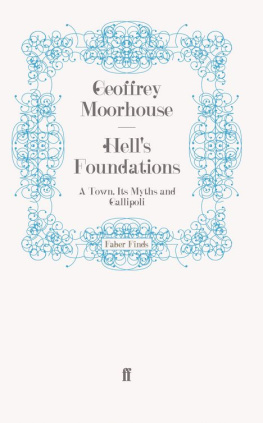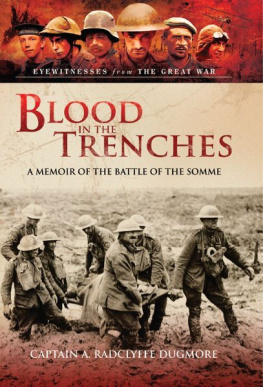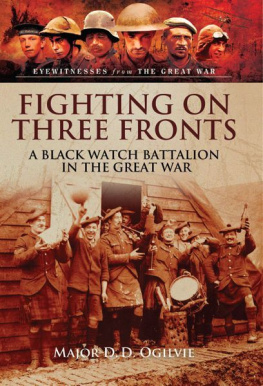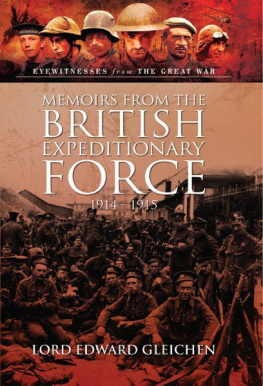This edition published in 2015 by
Pen & Sword Military
An imprint of
Pen & Sword Books Ltd.
47 Church Street
Barnsley
South Yorkshire
S70 2AS
This book was first published as Q.6.A and Other Places - Recollections of 1916, 1917, 1918 by Spottiswoode, Ballantyne & Co. Ltd., London, 1920.
Copyright Coda Publishing Ltd. 2015.
Published under licence by Pen & Sword Books Ltd.
ISBN: 9781473833555
PDF ISBN: 9781473866607
EPUB ISBN: 9781473866591
PRC ISBN: 9781473866584
A CIP catalogue record for this book is available from the British Library.
All rights reserved. No part of this book may be reproduced or transmitted in any form or by any means, electronic or mechanical including photocopying, recording or by any information storage and retrieval system, without permission from the Publisher in writing.
Printed and bound in England
By CPI Group (UK) Ltd., Croydon, CR0 4YY
Pen & Sword Books Ltd. incorporates the imprints of Pen & Sword Aviation, Pen & Sword Family History, Pen & Sword Maritime, Pen & Sword Military, Pen & Sword Discovery, Pen & Sword Politics, Pen & Sword Atlas, Pen & Sword Archaeology, Wharncliffe Local History, Wharncliffe True Crime, Wharncliffe Transport, Pen & Sword Select, Pen & Sword Military Classics, Leo Cooper, The Praetorian Press, Claymore Press, Remember When, Seaforth Publishing and Frontline Publishing
For a complete list of Pen & Sword titles please contact
PEN & SWORD BOOKS LIMITED
47 Church Street, Barnsley, South Yorkshire, S70 2AS, England
E-mail:
Website: www.pen-and-sword.co.uk
INTRODUCTION
I N THE FOLLOWING pages I have tried to set down as faithfully as I can some of the impressions which remain to me now of three years service in France and Flanders.
I have naturally suppressed much of the grim and ghastly horrors that were shared by all in the fighting area. A narrative must be written from some point of view, and I have had to select my own. I regret that so much personal and trivial incident should appear. Perhaps some will be able to see through the gross egotistical covering and get a glimpse, however faint, of the deeds of deathless heroism performed by my beloved comrades - the officers and men of the 7th Northumberland Fusiliers, the officers and men of the 149th Infantry Brigade, the officers and men of the 50th Division.
The climax of the story is the battle on the Somme where so many dear friends have perished. The name is taken from a spot where a small party of the 7th N.F. did something long afterwards to avenge their fallen comrades.
Finally no criticism of the Higher Command is intended by anything that has been written. If such can be read between the lines, it is unintentional and a matter for sincere regret.
CONTENTS
CHAPTER I
WHEN IT BEGAN
CHAPTER II
THE MEN OF THE NORTH COUNTRY
CHAPTER III
ALNWICK
CHAPTER IV
THE JOURNEY OUT
CHAPTER V
HILL 60
CHAPTER VI
MOUNT SORREL AND CANNY HILL
CHAPTER VII
KEMMEL
CHAPTER VIII
DIVISIONAL REST
CHAPTER IX
BRIGADE HEAD-QUARTERS
CHAPTER X
THE BRIGADE BOMBING SCHOOL
CHAPTER XI
ST. ELOI AND NEUVE EGLISE
CHAPTER XII
THE SOMME
CHAPTER XIII
HNENCOURT
CHAPTER XIV
MAMETZ WOOD
CHAPTER XV
THE 15TH SEPTEMBER, 1916
CHAPTER XVI
MILLENCOURT
CHAPTER XVII
HOOK SAP
CHAPTER XVIII
SECOND LEAVE - BRESLE
CHAPTER XIX
BUTTE OF WARLENCOURT - TRENCH WARFARE
CHAPTER XX
FRANCE AND THE FRENCH
CHAPTER XXI
SOUTH OF THE SOMME
CHAPTER XXII
THE BATTLE OF ARRAS
CHAPTER XXIII
WANCOURT TOWER - CROISILLES
CHAPTER XXIV
MONCHY-AU-BOIS
CHAPTER XXV
TRENCH WARFARE - VIS-CHERISY FRONT
CHAPTER XXVI
THE HOUTHULST FOREST
CHAPTER XXVII
DIVISIONAL REST NEAR ST. OMER
CHAPTER XXVIII
THE PASSCHENDAELE RIDGE
CHAPTER XXIX
GOOD-BYE TO THE 50TH DIVISION
CHAPTER XXX
DIGGING TRENCHES ABOUT LOOS
CHAPTER XXXI
THE GERMAN OFFENSIVE 1918 - SECOND BATTLE OF ARRAS
CHAPTER XXXII
TRENCH WARFARE - HBUTERNE
CHAPTER XXXIII
TRENCH WARFARE - THE COLINCAMPS RIDGE
CHAPTER XXXIV
THE BRITISH OFFENSIVE 1918 - BAPAUME RETAKEN
CHAPTER XXXV
THE STORMING OF THE HINDENBURG LINE NEAR TRESCAULT
CHAPTER XXXVI
THE GERMANS LAST STAND
CHAPTER XXXVII
THE FINAL RUSH FORWARD
CHAPTER XXXVIII
THE END OF IT ALL
NOTE
The following abbreviations are used:
B.H.Q. | - | Brigade Head-quarters. |
C.C.S. | - | Casualty Clearing Station. |
C.O. | - | Commanding Officer. |
C.T. | - | Communication Trench. |
D.A.Q.M.G. | - | Deputy-Assistant-Quartermaster-General. |
D.H.Q. | - | Divisional Head-quarters. |
F.A. | - | Field Ambulance. |
H.Q. | - | Head-quarters. |
L.-C. | - | Lance-Corporal. |
N.C.O. | - | Non-commissioned Officer. |
O.C. | - | Officer Commanding. |
O.P. | - | Observation Post. |
O.T.C. | - | Officers Training Corps. |
Q.M. | - | Quartermaster. |
R.T.O. | - | Railway Transport Officer. |
Y.M.C.A. | - | Young Mens Christian Association. |
CHAPTER I
WHEN IT BEGAN
B EFORE THE WAR I was living in London, with chambers at Lincolns Inn.
I was not surprised when the trouble started. Ever since 1904 it was reasonably clear to me that our country would have to fight the Germans or go under.
The days before we declared war on Germany were spent in London. During the last few of them it was as though a terrible thunderstorm was hanging overhead, ready to burst: gloom and foreboding on the faces of all. There is no doubt that most of our people were taken by surprise and that they were aghast at the sudden gathering of the war cloud. But when the stroke of fate fell and we were committed to the war, there was a curious sense of relief in many hearts. Better death and ruin than dishonour. A shameful peace or neutrality is for most Englishmen harder to bear than all the horrors of war. Besides, this struggle for freedom had to be fought out, though few can have foretold the cost.
I had been rejected for the Territorial Force by the Army authorities in 1908 on account of weak eyesight. I had therefore few hopes of better luck in August 1914. At first only trained men were enrolled at the Inns of Court O.T.C., and this went on for some months - till the nation in fact began to realise the size of its task. So after two or three vain attempts to find my way into the services, I had to be content with the truncheon and armlet of a special constable. With this force I had no special adventures, but I learnt a good deal about the Vine Street Police area, and about the electric power stations of the West End. Christmas Day was spent on duty in the streets, and Easter Day found me still there. Then something happened which decided my own little fate, as well perhaps as the fate of Europe. This was the sinking of the good ship


